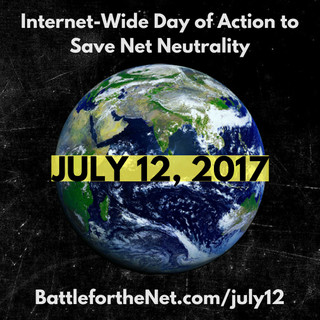Tech Companies Plan To Fight For Net Neutrality (Again) On July 12 (Updated)

Update, 7/12/17, 8:10am PT: The Day of Action has started, and Fight for the Future said that more than 100,000 "websites, internet users, and organizations" are protesting the FCC's plans to roll back net neutrality protections. The advocacy group also said that it's heard from people in Washington, DC and other locations about their plans to hold offline protests. More people are expected to show their support throughout the day.
Original article: 7/10/17, 9:45am PT:
The tech industry is preparing to take a stand for net neutrality...again. Facebook, Google, and other companies have all pledged their support to the Internet-Wide Day of Action to Save Net Neutrality planned by the Fight for the Future nonprofit organization. The Day of Action has a simple goal: convincing people who use some of the world's most popular websites to oppose the FCC's plan to roll back net neutrality protections.
Loosely defined, net neutrality is the idea that internet service providers (ISPs) shouldn't be able to discriminate between data sources. The go-to example is the threat of tiered internet packages that would require you to pay extra for access to streaming services like Netflix, Hulu, and so on. Other worries include the potential for premium lanes, which would see ISPs charge high-traffic companies for speedy data delivery to their customers, and giving ISP-offered services a leg up on the competition by offering free access to them or boosting their data transfer speeds.
Put another way: a byte is a byte is a byte, and expecting people to pay more for data simply because it comes from a particular source defies the idea of the open Web. That's why the FCC sought to protect net neutrality under the Obama administration and former chairman Tom Wheeler. Now the current leadership, chaired by Ajit Pai, wants to roll back those safeguards and reduce the FCC's influence over the internet.
In April, the FCC said that removing these protections would create jobs, defend Americans' privacy, and encourage ISPs to build out their infrastructure in under-served areas. Not long after, the agency said that it "took the first step toward restoring internet freedom and promoting infrastructure investment, innovation, and choice" by voting to move forward with Pai's proposal despite backlash from many U.S. citizens.
Not that the agency believes all that feedback is legitimate. The FCC said that its comments website was targeted by distributed-denial of service (DDoS) attacks soon after Last Week Tonight host John Oliver once again encouraged his viewers to support net neutrality. Now some of the world's largest tech companies will echo Oliver in encouraging their audiences to stand up for an open Web by opposing the FCC's proposal.
Stay on the Cutting Edge
Join the experts who read Tom's Hardware for the inside track on enthusiast PC tech news — and have for over 25 years. We'll send breaking news and in-depth reviews of CPUs, GPUs, AI, maker hardware and more straight to your inbox.
Fight for the Future said that more than 70,000 people, sites, and organizations have signed on to support the Day of Action by displaying "prominent messages" on their homepages or "using push notifications, videos, social media, and emails" to encourage their users to take action. Supporters include tech companies like Twitter, Amazon, and Netflix; digital rights groups like the Electronic Frontier Foundation, the Internet Archive, and Demand Progress; and media companies like O'Reilly Media and Funny or Die, with more members to be announced in the future.
Here's what Fight for the Future said on the Day of Action's website:
The FCC wants to destroy net neutrality and give big cable companies control over what we see and do online. If they get their way, they’ll allow widespread throttling, blocking, censorship, and extra fees. On July 12th, the Internet will come together to stop them.
Don't be surprised if some of your favorite sites look a little different on July 12, or if you receive messages from them encouraging you to stand against the FCC's plans. These companies don't agree on much, but they all seem to abide by the adage that the enemy of my enemy is my friend. We'll find out just how much of a difference this belief can make when the Day of Action kicks off in just a few days.

Nathaniel Mott is a freelance news and features writer for Tom's Hardware US, covering breaking news, security, and the silliest aspects of the tech industry.
-
Urzu1000 I don't see Tom's Hardware listed on the notable participants page.Reply
https://www.battleforthenet.com/july12/#participants -
shrapnel_indie ReplyLoosely defined, net neutrality is the idea that internet service providers (ISPs) shouldn't be able to discriminate between data sources. The go-to example is the threat of tiered internet packages that would require you to pay extra for access to streaming services like Netflix, Hulu, and so on. Other worries include the potential for premium lanes, which would see ISPs charge high-traffic companies for speedy data delivery to their customers, and giving ISP-offered services a leg up on the competition by offering free access to them or boosting their data transfer speeds.
Put another way: a byte is a byte is a byte, and expecting people to pay more for data simply because it comes from a particular source defies the idea of the open Web.
Loosely defined. yes, this is good. But... the devil is in the details. Before we agree and jump on any "net neutrality" rules, guidelines, laws, etc, we should look closely at the language used. Look closely at any addendum attached., everything about it. What may appear to be net neutrality may ultimately contain things that undermine the premise of the rules or outright make it mean something the summary does not imply. This actually is a good idea for whatever bill, rules, regulations, etc may come up. It's part of a good democratic view, where you can express to your representatives (who may do as they please anyway, which is a problem you can try to remedy on election day) what you think about it and anything else added to it. Of course it can't be "You got to vote on it before you can see what it says and is" as that defeats any transparency. If these representatives of ours are as transparent as they claim, as in our corner as they preach throughout their (re)election campaigns, they should have no qualms as letting us see the actual legislation, rules, etc they will vote on, unaltered and verbatim.
What do we have pay, for their version of net neutrality, vs the version of net neutrality they sell us? -
JonDol Reply19921873 said:I don't see Tom's Hardware listed on the notable participants page.
https://www.battleforthenet.com/july12/#participants
Maybe because it's not a notable participant? Not under their criteria anyways. -
JonDol Everyone should be with this action. If snooping on peoples data traffic is not stopped once for all, other countries could see their net neutrality harmed as well.Reply -
shrapnel_indie Reply19922018 said:Everyone should be with this action. If snooping on peoples data traffic is not stopped once for all, other countries could see their net neutrality harmed as well.
Did it really stop snooping on peoples data traffic? What did the complete unaltered rules say? -
theyeti87 "I'm sorry. The domain you are trying to access is not within your Internet Plan. Please upgrade your current Internet Plan to access the website."Reply -
bit_user Reply
Yeah, I'm pretty sure snooping was covered under a separate FCC rule that was recently struck down before it went into effect.19922103 said:
Did it really stop snooping on peoples data traffic?19922018 said:Everyone should be with this action. If snooping on peoples data traffic is not stopped once for all, other countries could see their net neutrality harmed as well.
It was a good rule, but separate from NN. -
gnarly_90 We already have tiered access packages. What we don't have is an effictive way for the ISP's to charge back to the companies riding on their consumer focused access packages. There is a reason the big iNet services companies (Facebook, google MSFT etc) want this, and its not because its good for you. They don't want to be charged back by ISP's for delivering their content to the end user. They only want to pay for circuits that leave their DC's and trunk to the local PAIX. Please don't fall for the false altruistic premise here folks.Reply -
bit_user Reply
It's like saying my electric company should have a way of charging LG for "riding on" my consumer electricity delivery to power my LG TV. They're not "riding on" my internet, it's me using my internet to access the the products and services I want.19923779 said:What we don't have is an effictive way for the ISP's to charge back to the companies riding on their consumer focused access packages.
And what consumers use should be paid for by them in a clear and direct way, so that promotions, subsidies, and extra fees can't be used by ISPs to distort the marketplace. -
coolitic While the *idea* of "net neutrality" is great, I am quite uncomfortable with this implementation as it gives the FCC more power and they don't have a good track record for going against monopolies.Reply
Most Popular

